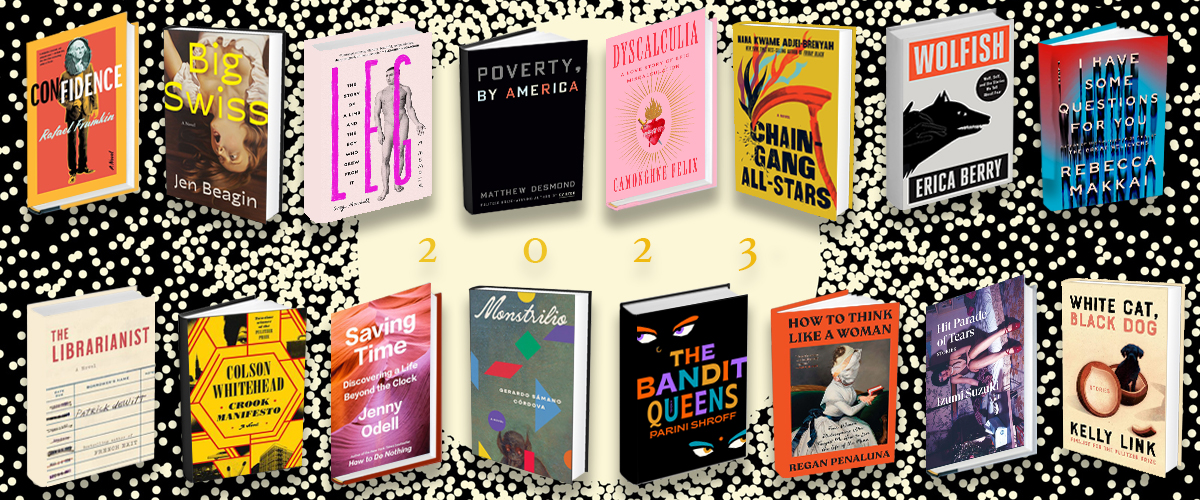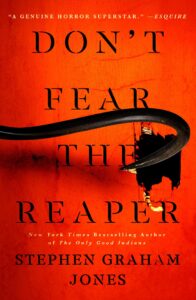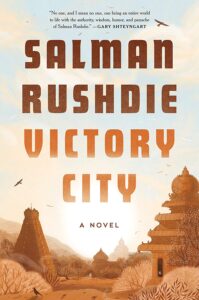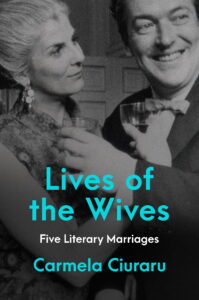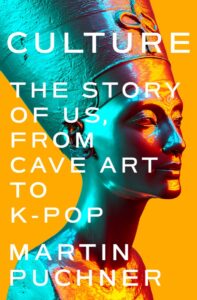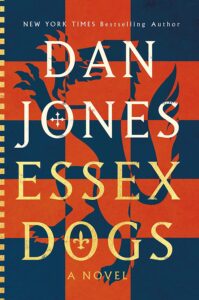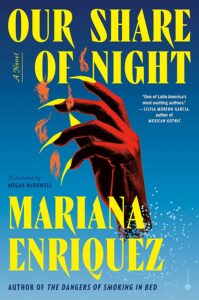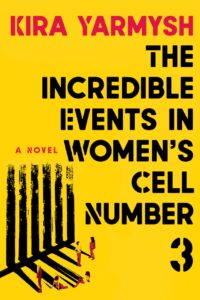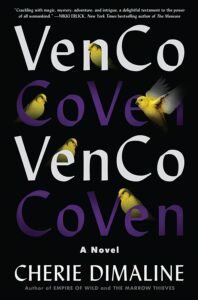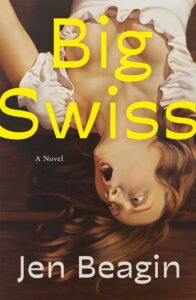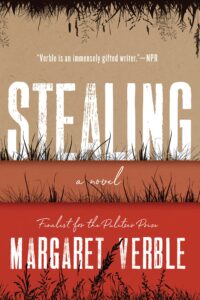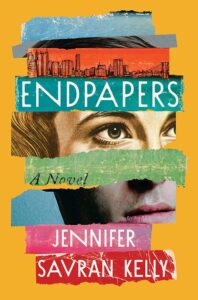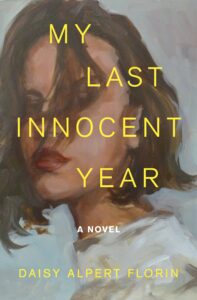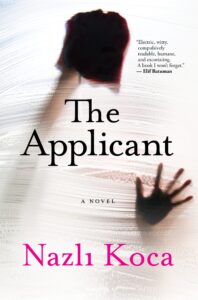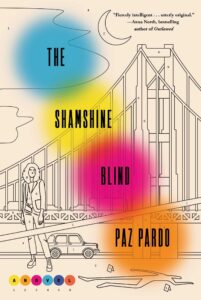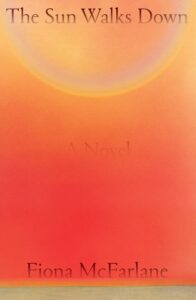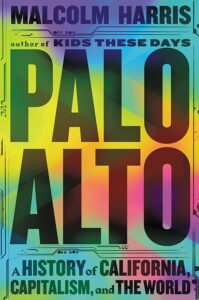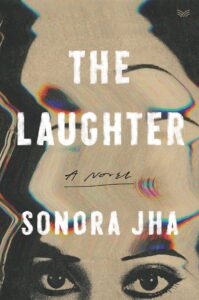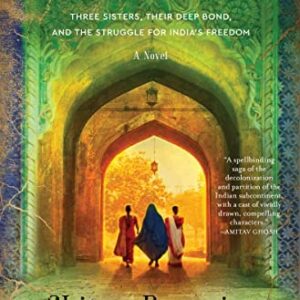FEBRUARY
Stephen Graham Jones, Don’t Fear the Reaper
Saga, February 7
Stephen Graham Jones blew me away with the first in his Indian Lake trilogy, My Heart is a Chainsaw, and Don’t Fear the Reaper is, if you can believe it, even better than the first! Jade is back, now in her 20s, as a killer and a snowstorm converge on the town of Proofrock and another massacre looms. Can Jade stop the serial killer Dark Mill South before he finishes taking vengeance for 38 Lakota men killed in the 19th century? The fast-paced novel takes place over only a day and a half, and you’ll want to read it just as fast. –MO
Charmaine Craig, My Nemesis
Grove Press, February 7
I’m highly intrigued by the premise of this novel. Tessa and Charlie’s friendship is built on the intellectual exchange of ideas (and maybe more?). They’re both married to other people: Tessa to Milton, and Charlie to Wah, whose traditional femininity Tessa doesn’t understand, and in fact abhors—she calls Wah “an insult to womankind,” and fallout ensues. I imagine that Craig, whose novel Miss Burma was longlisted for the National Book Award, has a lot to say here about feminism and solidarity, race, envy, and more. –ES
Salman Rushdie, Victory City
Random House, February 7
One can only hope Salman Rushdie continues to recover, in whatever form that takes, from the horrific attack he suffered this past year; he is, without a doubt, one of the greatest novelists of his generation. In what sounds like a return to the fantastical maximalism of his early career novels, Victory City is the (literally, classically) epic story of a divinely wrought city and the woman at its heart, whose centuries-long life is intertwined in the rise and fall of all those who make Victory City their home. –JD
Carmela Ciuraru, Lives of the Wives: Five Literary Marriages
Harper, February 7
The HarperCollins Union has been on strike since November 10, 2022. Literary Hub stands in solidarity with the union. Please consider donating to the strike fund.
I’m a sucker for any book about the wives of famous literary men (Z, The Paris Wife, to name a few), so a biography that sets out to tell only these stories is one I will devour. It’s an impressive project, the recovering of stories that are lost to time, or lost in the shadows of the imposing men they were married to. This specific biography focuses on five literary marriages, including Roald Dahl and Patricia Neal, and Kingsley Amis and Elizabeth Jane Howard, among others. The fact that I am only familiar with the names of the husbands in each marriage only goes to show how necessary books like these are. The Lives of the Wives guarantees to be a little gossipy, a little educational, and a vital revisionist history of these men and women. –JH
Dizz Tate, Brutes
Catapult, February 7
Told by a Greek chorus of neighborhood adolescent girls, Dizz Tate’s Brutes recounts the disappearance, and legend, of Sammy, preacher’s daughter, Eddie’s girlfriend, and now-vanished symbol of small-town glamour. They didn’t know her well before she was gone, but the group girls narrating the story are determined the find the truth of what made her leave, even if their innocence too vanishes along the way. –MO
Martin Puchner, Culture: The Story of Us, from Cave Art to K-Pop
W.W. Norton, February 7
Why do we make art? Why do we tell stories? What is it about humanity that just has to build a pyramid or write a concerto or spray paint the side of a subway car? With Culture, professor and public intellectual Martin Puchner attempts to answer these questions—along with a seemingly infinite array of others—as he takes the reader through millennia of human creation, always wondering what’s at the heart of our need to achieve. –JD
Dan Jones, Essex Dogs
Viking, February 7
Dan Jones, the New York Times bestselling historian and the writer and presenter of Secrets of Great British Castles, makes his fiction debut with this novel set during the Hundred Years’ War, and featuring the titular Essex Dogs: “an unruly platoon of archers and men-at-arms led by a battle-scarred captain whose best days are behind him.” Sounds like a TV show in the making. –ET
Mariana Enriquez, tr. Megan McDowell, Our Share of Night
Hogarth, February 7
What a strange and luminous novel. Mariana Enriquez stunned with her collection The Dangers of Smoking in Bed, and Our Share of Night is just as fantastic (and fantastical). Beginning in Argentina in the years of the dictatorship, Our Share of Night follows a father and son on a grief-driven road trip as they mourn the loss of the woman who united them, her dangerous (and possibly immortal) family close in pursuit. A dark vampiric noir that heralds a new era in South American horror. –MO
Kira Yarmysh, tr. Arch Tait, The Incredible Events in Women’s Cell Number 3
Grove Press, February 7
Debut novelist Kira Yarmysh has been Russian opposition leader Alexei Navalny’s press secretary since 2014, for which she’s been arrested several times and spent a month in prison. (She currently lives abroad in exile.) The Incredible Events in Women’s Cell Number 3 follows a young woman named Anya who’s arrested at an anti-corruption rally in Moscow and sentenced to ten days at a special detention center, where she and her cellmates, five Russian women from all walks of life, talk away the long hours. The phrase “essential reading” seems especially apt for this one. –ES
Cherie Dimaline, VenCo
William Morrow, February 7
The HarperCollins Union has been on strike since November 10, 2022. Literary Hub stands in solidarity with the union. Please consider donating to the strike fund.
If you loved the third season of American Horror Story, or just rode the wave of new witch books out this past year, then VenCo is for you! A millennial Metis woman finds a tarnished silver spoon in her wall that allows her to access indigenous magic and connects her to a host of witches hiding in plain sight. –MO
Jen Beagin, Big Swiss
Scribner, February 7
I mean, first of all, who can ignore that cover? Secondly, I’m getting big Moshfeghian vibes from the setup: Greta, who lives in a bee-filled 18th-century Dutch farmhouse in Hudson, New York, and makes her living transcribing sessions for a sex therapist, falls in love with a client she lovingly calls Big Swiss—whom she later encounters and begins an affair with, under a false identity. Thirdly, Jodie Comer has already signed on to play Big Swiss in the HBO series adaptation. So yeah, you could say I’M ANTICIPATING. –ES
Margaret Verble, Stealing
Mariner, February 7
A young Cherokee girl is ripped from her family and forced to endure terrible acts at a religious school bent on destroying her identity and connection to her people. While she resists by keeping her sense of self, the girl also tries to discover the truth behind why the state ripped her away from her father, and who in their small town wanted her gone. –MO
Jennifer Savran Kelly, Endpapers
Algonquin, February 7
A literary mystery perfect for the bookish crowd, Endpapers features a genderqueer book conservator unhappy in the gap between her sense of self and the life she lives. When she goes searching for the owner of a love letter she finds tucked in the pages of an ancient lesbian pulp paperback, she also goes in quest of the answer to a lifelong question: how to live an authentic representation of self. –MO
Daisy Alpert Florin, My Last Innocent Year
Henry Holt, February 14
In Florin’s debit novel, a Jewish college girl attempts to shed her working-class, Lower East Side roots while navigating a relationship with an older, married writing professor. A campus novel set in the late-nineties at New England college campus and a forbidden, ill-fated affair? Count me in. –EF
Nazli Koca, The Applicant
Grove, February 14
Sometimes you encounter a character in a book who you genuinely want to hang out with. We could be friends in real life, you think. Reader, meet Leyla. She’s flunked her thesis, is fighting the subsequent loss of her visa, and works at an Alice-in-Wonderland-themed hostel. She’s biding her time in Berlin until the courts send her back to her family in Turkey. And then one day, she meets a Swedish tourist who has the potential to change her life, if that’s what she decides she wants, that is. Torn between the dream of a creative and artistic life, her grieving family, and whatever future this man can promise, Leyla is a protagonist to root for. As someone who has actually worked at an Alice-in-Wonderland-themed restaurant before, I was particularly tickled by this premise. If you’re picturing the movie, and the tea is saying DRINK ME and the dessert is saying EAT ME, then this book is there saying READ ME. –KY
Richard Bausch, Playhouse
Knopf, February 14
The latest novel from the widely anthologized, certified writer’s writer Richard Bausch brings us to the Shakespeare Theater of Memphis, whose production of King Lear seems to be riddled with scandalous potholes. I love theater novels, and I love Bausch, which gives me high hopes for this one. –ET
Paz Pardo, The Shamshine Blind
Atria, February 14
This one’s got a cool premise—what if Argentina won the Falklands War using weaponized emotions, and the US, now a second-rate has-been, developed a strong illicit market in emotion-inducing drugs that are now in danger of influencing elections? And what if a “Latinx Sam Spade” (as the publicity material calls him) was investigating all this while providing wry social commentary? It’s difficult to find an alternative-history novel that is both this wacky and this believable. –MO
Fiona McFarlane, The Sun Walks Down
FSG, February 14
The latest novel from the author of The Night Guest is a lyrical, polyphonic story set in the Australian outback in 1883. A six-year-old boy goes missing in a dust storm, and McFarlane peels back the layers of the whole community, showing us how all the many members respond—to the crisis, to each other, and to the mythic, desperate landscape in which they live. –ET
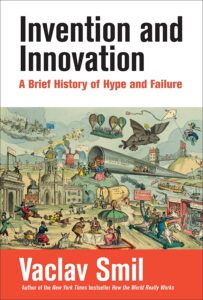
Vaclav Smil, Invention and Innovation: A Brief History of Hype and Failure
MIT Press, February 14
In what is essentially a history of invention (and therefore, in many ways, a history of civilization) Smil reminds us that human beings tend to fail a lot more than they succeed. And yet we are forever striving after better ways to do things, straining toward some perfectible society that no single generation will ever reach. Though Smil warns against our seemingly innate compulsion to overpromise, he also celebrates our capacity for collective innovation, and recognizes we’re going to need a lot of good ideas to get us out of the 21st century. –JD
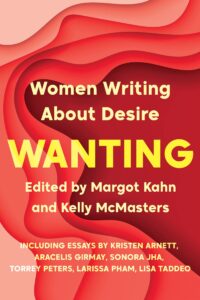
Margot Kahn and Kelly McMasters (eds.), Wanting: Women Writing About Desire
Catapult, February 14
Margot Kahn and Kelly McMaster’s 2017 anthology, This Is the Place: Women Writing About Home, is one of my favorites, so I’m thrilled to dig in to their latest. Featuring some of my favorite contemporary writers (Melissa Febos, Torrey Peters, Camille T. Dungy, Larissa Pham, Karen Russell, to name only a few!), Wanting is about all kinds of longing—from a pair of cowboy boots to a redo at life. –ES
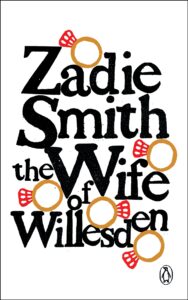
Zadie Smith, The Wife of Willesden
Penguin Press, February 14
“New Zadie Smith” is generally reason enough for anticipation. Throw in the fact that in this, her stage-writing debut, Smith translates Chaucer’s “The Wife of Bath’s Tale” for the 21st century, featuring Alvita, a Jamaican-born British woman with five marriages under her belt, as the titular wife, and I’m officially hooked. (And a PSA for anyone in the US who’s set on seeing a stage performance: The Wife of Willesden is coming to BAM in April.) –JG
Malcolm Harris, Palo Alto: A History of California, Capitalism, and the World
Little, Brown, February 14
In what’s billed as the “first comprehensive history of Silicon Valley,” Harris takes us back to the origins of northern California’s tech ascendancy. From 19th-century railroad barons to the counterculture capitalists of the 1970s, Harris tells a story of wanton hubris and curdled idealism, one that seeks to account for the global rise—in tech, in war, in capitalism—of an otherwise forgettably pleasant suburb of San Jose. –JD
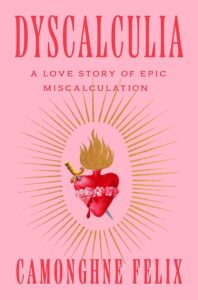
Camonghne Felix, Dyscalculia: A Love Story of Epic Miscalculation
One World, February 14
I’ve long been a fan of Camonghne Felix’s cultural criticism and poetry (her 2019 collection, Build Yourself a Boat, was longlisted for the National Book Award), so I’m thrilled that she’s gifting us with a memoir this year. Using her childhood dyscalculia as a metaphor, Felix delves into heartbreak and healing from childhood trauma. If you’re into poetic, rigorous personal narratives (think Elissa Washuta and Ocean Vuong), you’ll want this one on your list. –ES
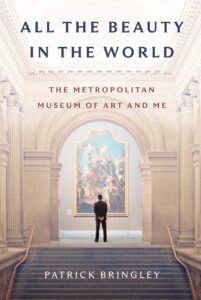
Patrick Bringley, All the Beauty in the World: The Metropolitan Museum of Art and Me
Simon & Schuster, February 14
New Yorkers and art lovers, prepare to be wooed by this memoir, which doubles as a loving portrait of the Met from one of its most inside insiders: Patrick Bringley, who worked at the museum as a guard for a decade. Time to plan a trip! –ET
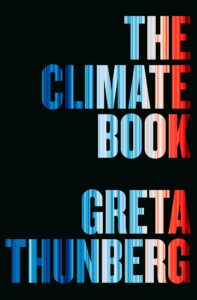
Greta Thunberg, The Climate Book
Penguin, February 14
The (still teenage!) Swedish environmental activist has gathered the wisdom of over one hundred climate experts—from geophysicists and oceanographers to economists and mathematicians, historians and engineers to philosophers and indigenous leaders—in order to “equip us all with the knowledge we need to combat climate disaster.” Alongside these expert opinions, Thunberg shares her own experiences documenting and uncovering greenwashing across the world. Thunberg is one of the most genuinely inspirational figures in public life today, and I’m excited to finally sit down with one of her books. –DS
Sonora Jha, The Laughter
HarperVia, February 14
The HarperCollins Union has been on strike since November 10, 2022. Literary Hub stands in solidarity with the union. Please consider donating to the strike fund.
In which a college professor (our narrator, Dr. Oliver Harding, naturally white and male, English department) becomes dangerously obsessed with his new colleague (Ruhaba Khan, Pakistani and female, Law), and all—the good and the terribly, terribly frightening—that she represents. Mat Johnson writes that the novel “takes the old suffocating male narcissist of Coetzee’s Disgrace and Nabokov’s Lolita and gives him new, previously unexplored dimension with a modern dissection of the Whiteness at his core.” Just my kind of book. –ET

Erica Berry, Wolfish: Wolf, Self, and the Stories We Tell About Fear
Flatiron, February 21
Erica Berry’s debut, a cultural legacy of the wolf, is a “kaleidoscopic exploration of wolves, both real and symbolic.” In the vein of H is for Hawk (e.g., what can an animal teach us about the writer and the human condition at large), Berry explores the life of legendary tagged wolf, OR-7. Alongside her own coming-of-age story, she unpacks our understanding of fear, danger, and the body. –EF
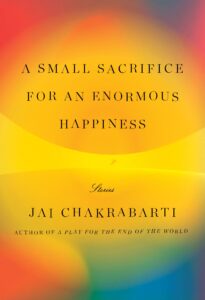
Jai Chakrabarti, A Small Sacrifice for an Enormous Happiness
Knopf, February 21
In these fourteen short stories about families and how to make them, Qian Julie Wang writes, “Chakrabarti brilliantly illuminates the moments—big and small—that define our shared humanity. Poignant, incandescent, and unforgettable.” Sounds like just what we need right now. –ET

Nona Fernández, tr. Natasha Wimmer, Voyager: Constellations of Memory
Graywolf, February 21
As a fan of Nona Fernández’s Space Invaders and The Twilight Zone, I’m just along for the ride. In the case of Voyager, the first stop is to the doctor, where Nona Fernández seeks an explanation for her mother’s falling spells and memory loss. If you’ve read her other books, you know that she is an expert at weaving seemingly disparate topics together, at finding their common threads. In this personal essay, she draws inspiration from the titular Voyager spacecrafts, leading us through outer space and internal medicine. (I’m reminded of that image that went around the internet some time ago, of two images side-by-side; one was a photo of the brain, and the other was an image of the universe, and they were nearly interchangeable.) Wherever this great writer (and translator!) wants to take us, I’m there. –KY
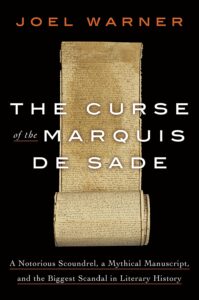
Joel Warner, The Curse of the Marquis de Sade: A Notorious Scoundrel, a Mythical Manuscript, and the Biggest Scandal in Literary History
Crown, February 21
I feel like the title of this one…kinda sums it up? Like, if you don’t want to read this book, what are you even doing on this site. And as a side note, I have already successfully pushed this book upon my coworkers by saying virtually the same thing. –MO
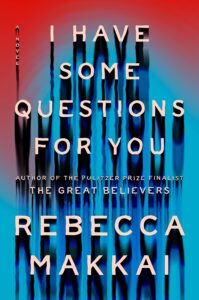
Rebecca Makkai, I Have Some Questions For You
Viking, February 21
Rebecca Makkai’s last novel, The Great Believers, a brilliant novel about friendship and family during the 1980s AIDS crisis in Chicago, was a finalist for both the Pulitzer Prize and the National Book Award. Her new book is a boarding school mystery that ticks all the right boxes. Bodie Kane, a filmmaker and podcaster, is invited to teach a class at her New Hampshire boarding school, The Granby School. The 1995 murder of her classmate, Thalia Keith, and the conviction of the school’s athletic trainer, Omar Evans, begin to weigh heavily on her mind—and real, worrying questions about the conviction, the police, and the school take shape. It’s two parts a true-crime who-done-it page turner, and one part condemnation of our justice and mass incarceration system—a must read. –EF
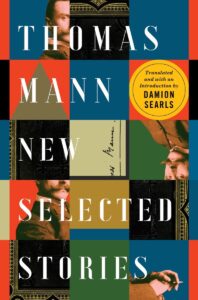
Thomas Mann, tr. Damion Searls, Thomas Mann: New Selected Stories
Liveright, February 28
I devoured the stories of Thomas Mann in my twenties; sadly (joyously?) that represents a long enough gap in years that I may truly be able to discover them anew in this fresh translation by the brilliant Damion Searls. “Death in Venice” as if for the first time? Yes please. –JD

Priya Guns, Your Driver is Waiting
Doubleday, February 28
Honestly, you had me at “queer feminist reboot of the iconic 1970s film Taxi Driver.” Starring Damani, who drives for a ride sharing app in a city full of protests, and who meets a beautiful, rich white girl—which is of course, the moment things start to go wrong. –ET
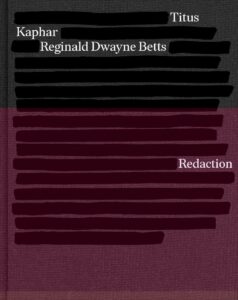
Reginald Dwayne Betts, Titus Kaphar, Redaction
W.W. Norton, February 28
A collaborative work between visual artist and filmmaker Titus Kaphar and poet, memoirist, and attorney Reginald Dwayne Betts, Redaction is a collection of prints first exhibited at MoMA PS1, layering Kaphar’s portraits of incarcerated people with Betts’ poetry to create a body of work about the abuses of the criminal justice system. I’m familiar with the power and beauty of Betts’ writing on the subject, so I have no doubt this collection will be stunning. –JG

